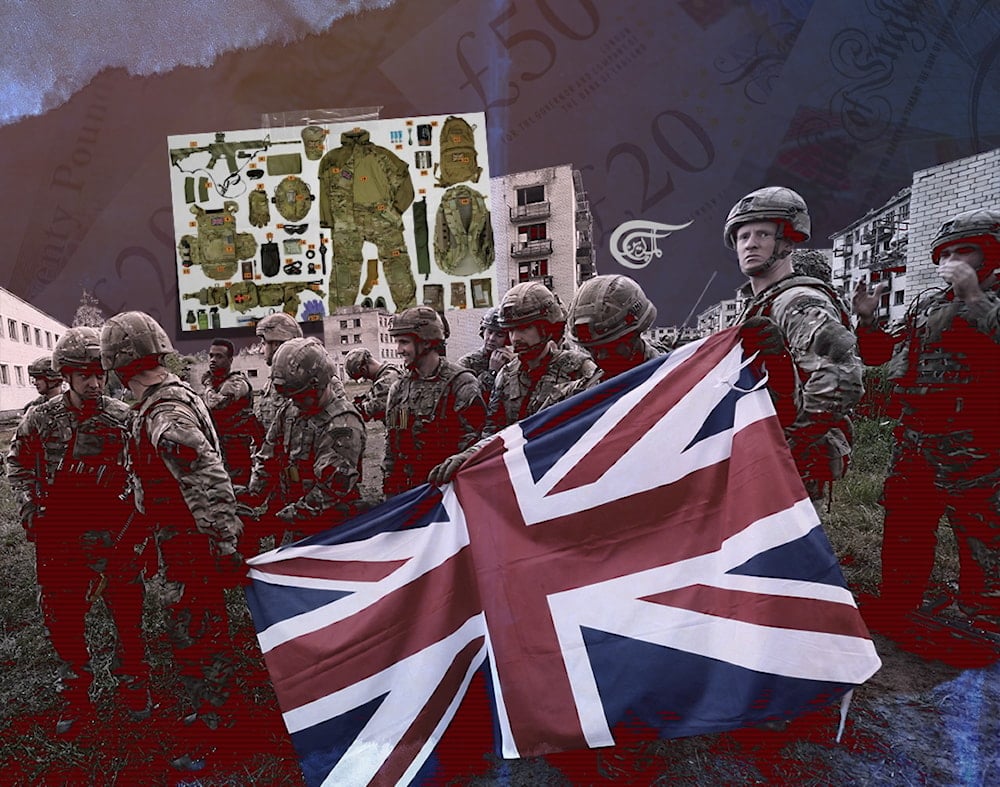It’s official: British Army facing extinction
In the UK the war in Ukraine “has raised serious questions regarding the preparedness of government, society and the defence industrial base to support conventional warfighting at scale," according to the bombshell report which went largely unnoticed.
-

"Britain has a Potemkin village military retaining the emblems of a pocket superpower, but without the necessary hard capabilities." (Al Mayadeen English; Illustrated by Ali Al-Hadi Shmeiss)
In September, Britain’s House of Lords International Relations and Defence Committee published a little-noticed report, Ukraine: a wake-up call. Based on extensive consultations with military veterans and think tank apparatchiks, it amply exposed London’s “decline as a full-spectrum military power,” and how the country’s fantastical “commitment to retaining global influence” is based on “military aspirations” that are “unaffordable”. The appraisal also amply underlines how the country is woefully ill-equipped and unprepared for major conflicts overseas, let alone defending itself at home.
The report’s topline findings are blunt. The Ukraine proxy war “has exposed fundamental weaknesses” in the “military strength” of both Britain and NATO. In London particularly, the conflict “has raised serious questions regarding the preparedness of government, society and the defence industrial base to support conventional warfighting at scale.” Put simply, the British have no “coherent model” for augmenting their “small” armed forces, with “capabilities needed to sustain or deter warfighting.” In an all-out hot war, their military would last weeks at most:
“[Britain’s] armed forces lack the mass, resilience, and internal coherence necessary to maintain a deterrent effect and respond effectively to prolonged and high-intensity warfare. In a war with Russia, [we] would need to be capable of fielding second and subsequent fighting echelons at the same time as providing military support to the protection of critical national infrastructure within the UK…[Supporting] our NATO allies…with a land force [requires] troops and ‘teeth’ units, which the UK cannot currently field.”
Multiple witnesses consulted by the Committee bemoaned how many core areas of Britain’s defences had been “hollowed out” in recent years. This dangerous deficit was particularly pronounced in the Army itself. A November 2021 decision to make the military “more agile, more integrated, and more expeditionary” reduced London’s forces to just 72,500 in total, and despite the proxy war, has not been reversed since. In January 2024, then-Defence Secretary Grant Shapps unbelievably asserted the British Army offsets this shortfall with a “can-do” attitude.
In written evidence to the Committee, Belarusian opposition activist Stepan Stepanenko and retired military officer John Holmes underlined Britain’s armed forces are smaller in number than Wembley Stadium’s seating capacity, “a stark visualisation of UK’s current limitations”, among many others. They called for London to construct a “significantly enhanced force, both in terms of manpower and modern, capable hardware.” Without a “large, agile, and technologically advanced strike force” that can strike “enemy logistics and command centres,” they believe Britain is finished as a military power.
Nonetheless, constructing that “large” military force, short of outright conscription, was forecast to be difficult. The pair proposed Britain “draw valuable lessons” from the Scandinavian model of “total defence”, in which the whole of society is readied for conflict at any time through a number of mechanisms. Somewhat amusingly, Stepanenko and Holmes suggested “initiating airsoft rifle clubs under the supervision of Army personnel could serve as a practical measure to familiarise the British public with basic weapon maintenance and operation.”
‘Very Expensive’
Nick Carter, Britain’s Chief of Defence Staff (June 2018 - July 2022), who was slammed for his “gross lack of concern for subordinates” while commanding London’s forces in Afghanistan 2009/10, and described by senior US military chiefs as “not the type of general I would put in charge of anything,” echoed these concerns. He told the Committee that the British Army was “hollowed out not only in terms of manpower but equipment,” in every conceivable field.
Carter declared that the most “relevant” lesson from the Ukraine proxy war was “how rapidly you go through materiel.” Currently, Britain does “not have the stockpiles and munitions, frankly, to fight for the length of time that I suspect we would have to fight for,” and “there is a great deal of additional equipment that one would want to give the British Army if it was going to fight…before you start looking at its stockpiles.” He slammed successive governments for being “absolutely rubbish at procuring”:
“Numbers matter. The fact that we are going down to only a couple of regiments of tanks is not a good place to be…We also require artillery at much larger scale... We need air defence systems, the likes of which are not in service either. I do not think we have the electronic warfare capability we need, and we certainly do not have drones down to the lowest tactical levels that Ukraine and, for that matter, Gaza pretty profoundly teach us we do need.”
On the subject of electronic warfare, the Committee report noted that the Ukraine proxy war offered “a unique case study for understanding the role of electromagnetic warfare in modern conflict.” Highly decorated Air Chief Marshal Stuart Lord Peach testified that the conflict “is the densest, most complex and dangerous electronic operating environment we have ever seen.” Extensive use of sensors and drones have made moving around battlefields undetected all but impossible, with all manner of repercussions for “command-and-control structures”.
In the manner of all “expert” witnesses consulted by the Committee, neither Carter nor Peach outlined any tangible remedies for resolving the myriad issues they discussed. At one stage during his testimony, the former acknowledged, “all of what I have described is very expensive,” and “I do not have a smart way of working out where the money is coming from, or how quickly our defence industry will be able to boot itself up to be able to deliver all of that.” Which is reassuring.
‘Grandiose Ambitions’
The bombshell House of Lords Committee report elicited zero mainstream media interest after publication, remaining entirely unremarked upon until November 22nd, when the Financial Times referenced its damning contents in a withering op-ed on a strategic review initiated by Starmer in July. The contours of this “root and branch” appraisal of Britain’s military capabilities are already becoming clear, long before completion. A quintet of Royal Navy warships are earmarked for international sale, or simply scrap metal, while savage cutbacks in defence spending have been initiated.
The FT noted recent geopolitical upheaval means “familiar pillars” of London’s “postwar foreign policy” - first and foremost, total reliance on American succor to internationally operate - have “now been upended.” Resultantly, “the world is a more dangerous place than at any time since the end of the Cold War,” and “Britain is particularly vulnerable.” Consequently, Ministry of Defence military chiefs openly admit “their forces would struggle to fight a European war lasting more than a few weeks”:
“Britain has a Potemkin village military retaining the emblems of a pocket superpower, but without the necessary hard capabilities. The present disordered world does not leave room for such tricks… The [military’s] hollowing has left an army smaller than at any time since the Napoleonic wars, a navy that cannot afford an adequate strike force for its flagship aircraft carriers and Royal Air Force pilots denied flight training by budgetary constraints.”
The House of Lords report’s “grim conclusions” are, per the FT, “viewed within Whitehall as wholly uncontroversial.” Yet, the outlet goes far further in its scathing censure of London’s 21st century military capabilities. For example, that report didn’t once reference Britain’s dual white elephants of two effectively useless aircraft carriers, and “independent” Trident nuclear deterrent. Prior British parliamentary investigations have branded the latter “a hostage to American goodwill”, retained by London to “maintain the facade” of being a major power. By contrast, the FT writes:
“The carriers reflect persistent delusions about Britain’s global role. It is only a few years since Boris Johnson was proclaiming ‘Global Britain’s’ tilt to Asia. Absurdly, the navy lacks the destroyers, frigates and submarines needed to defend its flagships…A brave government would also ask whether it is wise to spend so many billions on a nuclear system maintained by the US when it lacks funds to buy enough of the drones and digital systems dominating the battlefield in Ukraine.”
The FT is not optimistic that Starmer’s strategic review will address these fatal issues. After all, the “hallowed tradition of such reviews is…[reconciling] grandiose ambitions with economic austerity,” rather than serious proposals producing concrete action. As such, “the big danger is that the review will see arguments about how to maintain existing capabilities as a substitute for recognition of the big picture.” A truly “hard-headed” probe, the outlet declares, “would conclude Britain cannot afford status symbols when the threat is on its own continent.”
However, in the precise manner of the House of Lords report, the FT is unable to suggest solutions to the manifold problems it identifies. The outlet correctly acknowledges “gaps” in Britain’s defences will not be rectified by a “small uptick” in government spending, and the country “needs to prepare for a prolonged rise in the resources devoted to the nation’s security.” But the sole prescription provided to this conundrum is for the civilian population “to be persuaded that it needs to pay for it.”
As the US Empire is currently learning at some cost, ability to fund a global military apparatus is practically irrelevant when the means of innovating and producing equipment and munitions required to sustain it have been decimated via offshoring and outsourcing. Restoring the industrial capacity and expert knowledge necessary to begin rebuilding London’s armed forces will take decades, and cannot be achieved via mere fiat. To say the least, the British are in deep trouble. So why are they openly mulling formal deployment to Ukraine?

 Kit Klarenberg
Kit Klarenberg
 9 Min Read
9 Min Read











